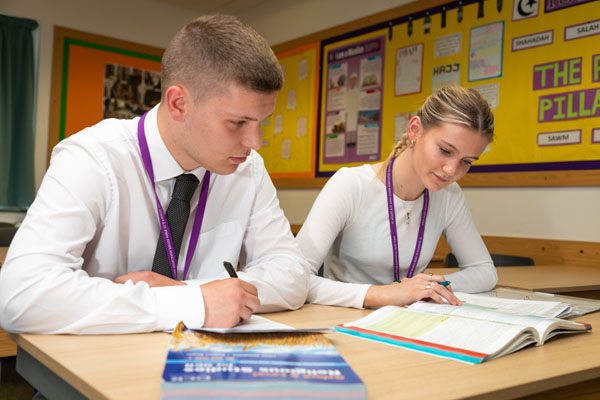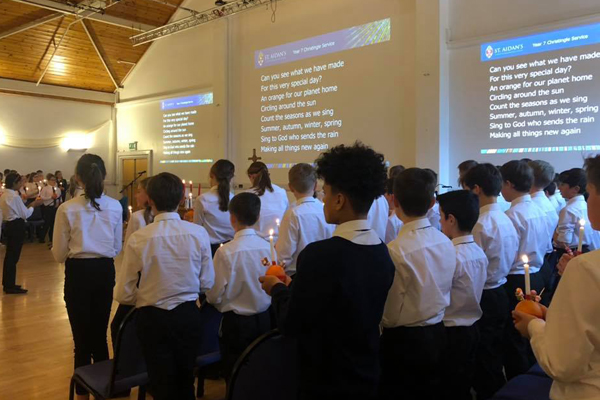Introduction
Religious Studies Vision:
RS at St Aidan’s Church of England High School explores big questions about life, to find out what people believe and what difference this makes to how they live, so that we can make sense of Christianity and worldview, reflect on our own ideas and ways of living. (in bold)
The principal aim of RS is to enable students to hold balanced and informed conversations about religion and belief.
Religious education in a Church school should enable every child to flourish and to live life in all its fullness. (John 10:10). It will help educate for dignity and respect encouraging all to live well together Such an approach is offered through a commitment to generous hospitality, being true to our underpinning faith, but with a deep respect for the integrity of other religious traditions (and worldviews) and for the religious freedom of each person. (Religious Education in Church of England Schools: A Statement of Entitlement 2019)
The St Aidan’s RS curriculum is set within the context of the Church of England Vision for Education: Deeply Christian, Serving the Common Good, 2019. The Executive summary
states: ‘In Church schools the deeply Christian foundation for this vision will be seen explicitly in teaching and learning both in RE and across the curriculum, and also in the authentically Christian worship and ethos of those schools.’ RS has an essential place within the vision of our school. This is a vision that goes beyond, beyond British Values and spiritual, moral, social, and cultural development (SMSC). It is a vision that: ‘…embraces the spiritual, physical, intellectual, emotional, moral, and social development of children and young people. As a Church school we offer a vision of human flourishing for all, one that embraces excellence and academic rigour, but sets them in a wider framework. This is worked out theologically and educationally through four basic elements which permeate our vision for education:
•Wisdom
•Hope
•Community
•Dignity…
‘The vision is for the common good of the whole human community and its environment, whether national, regional, or local. It is hospitable to diversity, respects freedom of religion and belief, and encourages others to contribute from the depths of their own traditions and understandings. The RS curriculum at St Aidan’s fits within this broader vision of education.
Religious Studies in our Church school enables us to flourish and to live life in all its fullness. (John 10:10). It helps educate for dignity and respect encouraging all to live well together Such an approach is offered through a commitment to generous hospitality, being true to our underpinning faith, but with a deep respect for the integrity of other religious traditions and worldviews to support the religious freedom of each person. (Religious Education in Church of England Schools: A Statement of Entitlement)
The RS curriculum at St Aidan’s follows fits within this broader vision of education.
Curriculum Intent-
[Aims and purposes of Religious Education in the Church School- Dioceses of Leeds York Syllabus]
The principal aim incorporates the following aims of Religious Education in Church schools:
- To enable pupils to know about and understand Christianity as a living faith that influences the lives of people worldwide and as the religion that has most shaped British culture and heritage.
- To enable pupils to know and understand about other major world religions and non-religious worldviews, their impact on society, culture, and the wider world, enabling pupils to express ideas and insights.
- To contribute to the development of pupils’ own spiritual/philosophical convictions, exploring and enriching their own beliefs and values.
- Appropriate to their age at the end of their education in Church schools, the expectation is that all pupils are religiously literate and as minimum pupils can demonstrate the following skills.
- Give a theologically informed and thoughtful account of Christianity as a living and diverse faith.
- Show an informed and respectful attitude to religions and non-religious worldviews in their search for God and meaning.
- Engage in meaningful and informed dialogue with those of other faiths and none.
- Reflect critically and responsibly on their own spiritual, philosophical, and ethical convictions.
Staff
Ms K Wilson – Head of Religious Studies
To view the Religious Studies Learning Journey, please visit the link below:
KS3
KS3 all pupils take Religious Studies. Our team of specialist Religious Studies teachers have all contributed to the process of designing our KS3 curriculum, which is in the process of evolving into “KS3 Curriculum 2025”. “KS3 Curriculum 2025”. be even more coherent and challenging than our existing KS3 curriculum. Informed by the Ofsted research review series: Religious Education , as well as by work by the Church of England in response to this , KS3 Curriculum 2025 portrays Religious Studies as an academically rigorous, multidisciplinary subject, with personal and social relevance. It accepts that
‘Getting better’ at RE both at primary and secondary level comprises knowing more and remembering more of these pillars as they are set out within the RE curriculum: ‘substantive’ knowledge: knowledge about various religious and non-religious traditions, ‘ways of knowing’: pupils learn ‘how to know’ about religion and non-religion and ‘personal knowledge’: pupils build an awareness of their own presuppositions and values about the religious and non-religious traditions they study” and that “In high-quality RE curriculums, these 3 types of knowledge are not artificially separated from each other.”
- Guided by the Church of England , we have focused on Theology, Philosophy and Human/Social Sciences as ways of knowing about religion and worldviews.
- Guided by the Leeds & York Diocese, we will continue to devote 2/3 of our curriculum time to Christianity and the remaining 1/3 to the study of selected other religious and non-religious worldviews, exploring content related to the questions specified in the Diocesan Syllabus – Understanding Christianity.
KS4
There are two options in Religious Studies, both of equal status and of equal challenge:
- Option 1 – Christianity, Islam and four Philosophical and Ethical themes
- Option 2 – Christianity, Islam, two Philosophical and Ethical themes and two St. Mark’s Gospel themes
For further information please see our KS4 Options Booklet 2025
KS5
Religious Studies is for those who enjoy learning and who are interested in exploring and challenging ideas. Lessons in Religious Studies are varied and include active learning, discussion, group work, independent work, reading and essay writing. The study of Theology, Philosophy and Ethics helps students to think logically and clearly about issues that affect the whole of life. The Associated departments aim to provide high quality academic teaching for A level students and also to stimulate interest and open-minded debate. Religious Studies is a popular A level course that is valued by universities.
For further information please see our Associated Sixth Form Prospectus
Additional Learning Resources
Please speak to your RS teacher or visit your class Team regarding additional learning resources within the department. Useful webpages for each Key Stage can be found below:
Key Stage 3
https://www.bbc.com/bitesize/subjects/zh3rkqt
Key Stage 4
https://www.senecalearning.com/blog/gcse-religious-studies-revision/
http://www.rsrevision.com/contents/index.htm
Key Stage 5
https://ithinkthereforeiteach.wordpress.com/as-philosophy-revision-podcasts/
https://thepanpsycast.com/home
http://www.philosopherkings.co.uk/



